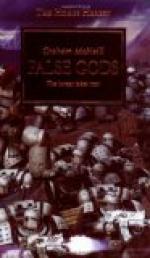But the talkers are talking and Art Nouveau rockers are rocking, and the trousers of the prophet are patched with stained glass, and it is a day of dinkiness and of thumbs.
Let us find comfort in the ancient proverb: “Art talked to death shall rise again.” Let us also recollect that “Dinky is as dinky does;” that “All is not Shaw that Bernards;” that “Better Yeates than Clever;” that words are so inexpensive that there is no moral crime in robbing Henry to pay James.
Firmly believing all this, abjuring all atom-pickers, slab furniture, and woodchuck literature—save only the immortal verse:
“And there the wooden-chuck doth
tread;
While from the oak trees’
tops
The red, red squirrel on the head
The frequent acorn drops.”
Abjuring, as I say, dinkiness in all its forms, we may still hope that those cleanly and respectable spinsters, the Sister Arts, will continue throughout the ages, rocking and drinking tea unterrified by the million-tongued clamor in the back yard and below stairs, where thumb and forefinger continue the question demanded by intellectual exhaustion:
“L’arr! Kesker say l’arr?”
D. APPLETON AND COMPANY, PUBLISHERS, NEW YORK.
* * * * *
THE MASTERPIECE OF A MASTER MIND.
The Prodigal Son.
By Hall Caine. 12mo. Ornamental Cloth, $1.50.
“The Prodigal Son” follows the lines of the Bible parable in the principal incidents, but in certain important particulars it departs from them. In a most convincing way, and with rare beauty, the story shows that Christ’s parable is a picture of heavenly mercy, and not of human justice, and if it were used as an example of conduct among men it would destroy all social conditions and disturb accepted laws of justice. The book is full of movement and incident, and must appeal to the public by its dramatic story alone. The Prodigal Son at the close of the book has learned this great lesson, and the meaning of the parable is revealed to him. Neither success nor fame can ever wipe out the evil of the past. It is not from the unalterable laws of nature and life that forgiveness can be hoped for.
“Since ‘The Manxman’ Hall Caine has written nothing so moving in its elements of pathos and tragedy, so plainly marked with the power to search the human heart and reveal its secret springs of strength and weakness, its passion and strife, so sincere and satisfying as ’The Prodigal Son.’”—New York Times.
“It is done with supreme self-confidence, and the result is a work of genius.”—New York Evening Post.
“‘The Prodigal Son’ will hold the reader’s attention from cover to cover.”—Philadelphia Record.
“This is one of Hall Caine’s best novels—one that a large portion of the fiction-reading public will thoroughly enjoy.”—Chicago Record-Herald.




